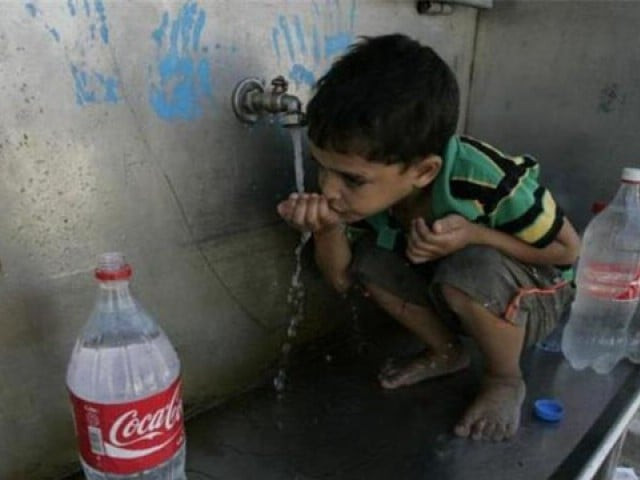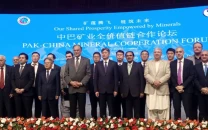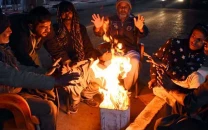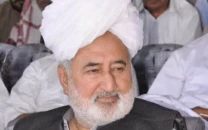SC takes Murad Ali Shah to task
CM to submit affidavit on timeframe in which Sindh’s water issues will be resolved

PHOTO: AFP
It expressed its regret over the failure of the provincial government to realise the importance of the issue as well as its failure to meet its basic obligations to provide essential and basic services to the people of Sindh.
Taking up the matter again on Wednesday, the SC bench, headed by Chief Justice of Pakistan Mian Saqib Nisar, made Chief Minister Murad Ali Shah watch a short documentary depicting the sorry state of affairs relating to water and sanitation in the province.
Justice Nisar then told the CM that the court had summoned him with great respect. "Our objective is only to rid people of this polluted water," he said.
However, Justice Nisar said he was deeply saddened by the state of affairs and the court wanted to change the situation. He said he wished Pakistan Peoples Party Chairperson Bilawal Bhutto Zardari was also present in the court to witness the situation.
“Give your children a good life before you leave [office],” he told the CM. “People are drinking water mixed with human waste,” he remarked. "If you [agree], you and I can travel to Mithi and both of us will drink a glass of water from the stream," he said, adding that the video should be televised on all media channels to spread awareness about the state of affairs in the province.
Karachi’s water unfit for human consumption
However, Shah disputed the video’s content and said it exaggerated the conditions of drinking water supply and sanitation. “If I get an opportunity, I will present another video to the court very soon,” he said.
Justice Nisar told Shah that while he might reject the video, he should read the commission’s report. “Review the gravity of the situation from the report and try to find solutions through it,” he told the CM.
Justice Nisar asked Shah not to take the matter negatively and said the provincial government could seek help from the court if need be. "We will [help] you, but give us a guarantee that the matter will be resolved,” he asked.
Another bench member, Justice Faisal Arab, remarked that no cases against the Sindh government were filed during the previous government’s tenure. “People turn to the court after witnessing failure of the government,” the judge said, telling the CM that they were there to find a solution.
"You were elected [by the people] to solve issues," Justice Arab told Shah. "The court has no desire to use the administration's authority," the judge told the CM, adding that it was the duty of the government to resolve such issues facing the masses.
Government fails to satisfy Supreme Court on treatment plants issue
The CJP remarked on the gravity of the situation and said it was the responsibility of the provincial government to resolve the issue. “What future will we offer our children if we provide them water [contaminated] with human waste?” he questioned.
Justice Nisar, however, observed that no steps were taken until the Supreme Court’s intervention. “This post is a responsibility. We do not want to say anything [about] who is responsible,” he added.
“You have not said anything despite having said everything,” Shah replied, causing laughter to fill the courtroom.
The top judge told the CM that the court was ready to shoulder his burdens with him. “Our shoulders are very powerful,” he said.
The provincial chief executive said: “We have come on the shoulders of the voters. We have trust in them.” To this, another bench member Justice Sajjad Ali Shah said the voters also bring their problems to the court.
“We are bound by our conduct, that’s why we do not want to answer to political statements. Otherwise, we too have answers,” cautioned Justice Nisar. “We are playing a constitutional role in public interest,” he maintained, but stated that “whenever there will be a void, the judiciary will continue to fill it.”
Safe water project: 116 filtration plants installed in different villages
Justice Nisar asked Shah to point out any mistakes, if any, in the commission report, directing him to undertake before the court that the issue would be resolved. He told Shah, “Education and health now [lie] with you, the problems and the solutions as well.”
When the CM said the issue was complicated and needed time to be properly addressed, Justice Nisar said the court was ready to give him a full year to resolve the matter. “Give us a timeframe,” he said.
Prevaricating, Shah said other provinces also had problems and Sindh should not be the only one asked to resolve their issues. He said 73% of the population of Sheikhupura and 94% of Gujranwala were drinking polluted water.
Justice Nisar said the apex court was equally concerned with issues in other provinces and other provinces’ governments were also being asked to provide clean drinking water to the people. “We will make this case a benchmark for the other [provinces],” the top judge told the CM.
Shah said he had received six summaries for implementation of the commission’s recommendations, adding that they were being implemented and the funds were being released. He argued that under Article 175 of the Constitution, the judiciary and the executive had been conferred separate powers.
‘Polluted water being sold as mineral water’
“We are the custodians of the rights of Pakistanis and the Constitution gives us such powers,” remarked Justice Nisar, telling the CM that if he wanted to get into a legal discussion on powers then he will explain the judiciary’s powers. Observing that Article 175 had nothing to do with the executive, he asked Shah to focus on how to protect the peoples’ rights.
The CM assured the court that he would devise an executable plan and fully implement it. He requested time from the court to resolve the issue.
“Being the chief minister of Sindh, you will have to submit an affidavit to the court stating the time required for the task,” the CJP told Shah. The CM said he would give the court a timeframe about the plan of action, methods, finances and resources needed for the job.
"You received votes from the people and you are the one who is answerable [to them]," the CJP told Shah.
To this, Shah said they had come into power through votes and their voters had very strong shoulders.
"Some court decisions are impacting the performance of the executive," Shah complained, prompting Justice Nisar to offer him the court’s shoulders as a means to resolve the issues at hand.
The top judge reminded the CM that under the Constitution, water and sanitation issues fall into the domain of fundamental rights. "The court has the authority to intervene if the executive does not fulfill its duties," the judge clarified.



















COMMENTS
Comments are moderated and generally will be posted if they are on-topic and not abusive.
For more information, please see our Comments FAQ